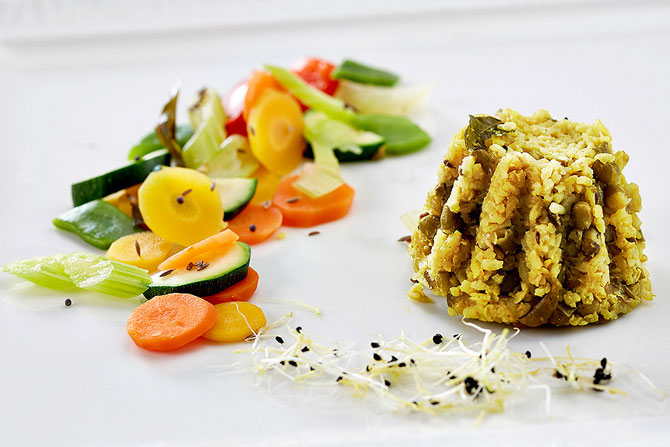Photographs: Dan Conway/Creative Commons Shameem Akthar
Shameem Akthar looks at unconventional ways to heal the digestive tract.
The digestive system is celebrated, in all alternative therapies, as the main tool in sorting the problems of the rest of the human body.
Intriguingly, while food in modern medicine is regarded as part of one’s healing, modern medicine does not have a full-fledged complementary tool in this field.
For instance, while your doctor might prescribe you a long list of medicine, he or she will probably direct you to a nutritionist if you ask what you should eat for an ailment. This lacuna in modern medicine is curious. Alternative therapies believe that a lot of problems that bother your body come from bad food habits.
Every healing system will offer a different list of curative foods for specific problems. Some go further and give a different list of foods for different personality types. Our ancients across the world had a deep understanding of the link between food and health. They used lyrical and strange vocabulary to describe these links.
Not surprisingly, therapies look at the powerful psychosomatic triggers that might lead to digestive problems. Louise L Hay, the celebrated healer, known for her best-sellers, believes stomach upsets are a result of our fear of the new, and inability to embrace changes in our lives.
Yoga
Photographs: Rediff Archives
The digestive system is controlled by the manipura chakra or the crown jewel centre according to the science of yoga. It is also regarded as the ego centre, which is not so far off the mark if you understand biology. The stomach is referred to as the second brain since it always reacts to all stress or sense signals. The stomach works in tandem with what we think and can go into a slowdown when we are stressed.
This evolutionary mechanism perceives emergencies and allows blood to shift to where it may be needed more, closing off on where it can wait. The stomach is believed to be so sensitive to how we think that it can change colours with our thoughts.
How we eat (slowly, meditatively), the timing of our food (regular meal timings that signal that all is fine with us), the amount we eat (less could be more, since as the energy levels go up, we will find our dietary needs reduce) determine our health. Some poses are said to be particularly helpful with digestion: vajrasana (thunderbolt pose), the supta vajrasana (lying thunderbolt pose) for instance.
Yoga’s study of the digestive system, and its connection to our health, is elaborate since it believes we are ultimately what we eat.
Crystal therapy
Image: Crystal Therapy at the spa facility in ITC Grand Central, MumbaiPhotographs: Courtesy ITC Grand Central, Mumbai/Luxury Collection Hotels and Resorts
Crystals belonging to a rich palette of colours are used in healing the digestive system. On this subject crystal therapy has much in common with yoga. Though the dominant colour of this centre, also referred to as the solar plexus, is yellow, other colours like black, red, green, blue-green is also used, depending on the nature of your ailment.
To cool an inflamed digestive tract green stones like peridot and green jasper is used. Other cooling stones are blue or blue green, such as chrysocolla, the flamboyant but commonly available labradorite. To strengthen the system dark coloured stones the silvery iron pyrite or majestic black obsidian are used.
For general health of the system, yellow stones are used: the sparkling citrine, the luminescent topaz. Where emotional turmoil is the cause, pink stones may be used.
Ayurveda
Image: Ayurveda food from Ayurveda & Spa Resort SonnhofPhotographs: Marketing Delux/Creative Commons
The most exciting insight into the digestive system comes from ayurveda. Each personality type (ayurvedic dosha) is prescribed a different diet. Personality types are likely to eat or prefer foods that aggravate their dosha.
For instance, the lethargic kapha type must avoid excessive consumption of grains or starch. These foods replicate their dosha so much (calming, soothing and grounding), that they automatically reach for starches, becoming more overweight or more sluggish.
The foods that incite the other elements of pitta (fire) and vata (air) are actually what helps the kapha harmonize -- this means spicy foods or raw foods. This applies for other doshas as well.
Once you become aware of these connections drawn up by Ayurveda it can become an exciting and a surefire way to heal your digestive tract woes. The foods are also representative of the elements and must be used wisely to harmonize and balance them. Clearly this needs an expert prescription.
But these days very easy-to-read books on these topics by authors who do not use esoteric or excessively arcane language can help each of us understand ourselves better and therefore heal ourselves by tweaking our dietary habits. Authors who make Ayurveda accessible to the lay public include Dr Vasant Lad, Dr Robert Svoboda, Dr David Frawley.
Aromatherapy
Image: Aromatherapy oil salePhotographs: Joe Long/Creative Commons
You can often get immediate relief for digestive ailments if you follow aroma therapy. For instance, for nausea, just by inhaling certain essential oils like fennel, lavender, Melissa, rose and sandalwood.
Most oils are relaxing. They may help to settle an upset system at an emotional level too. To perk up sluggish digestion coriander oil is recommended.
Other perky oils for the same problem include ginger, nutmeg and origanum. These may also be used as compresses on the stomach. Or as a massage oil, mixed with carrier oils.
For lack of appetite, the peppy bergamot, black pepper, the all-purpose roman chamomile are suggested.
For diarrhea geranium and its opposite, constipation, marjoram are suggested.
Clearly, there is no all-purpose oil for the digestive tract. Each problem of the system requires a specific oil and therefore must be only used after consultation with an aroma expert.






Comment
article